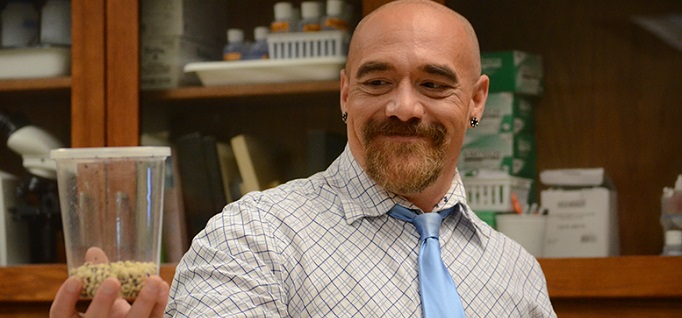Real-world, research-based opportunities
By Jonathan Williams
August 29, 2018
A biology course will give students hands-on experience trying to solve a very real problem.
As students return to the Davidson County Community College (DCCC) campus in North Carolina, the fall semester will hold a new opportunity for those who want to discover real solutions to very real problems affecting people in the world.
This opportunity comes in the form of a new CURE (Course-based Undergraduate Research Experience) biology course, which allows students to develop their own experiments and ideas to better understand what natural pest control might help save almost 60 percent of crop yields in Africa and South Asia.
“I’m hoping students develop a real interest in science,” said biology faculty member Joe Felts. “With students generating their own ideas and experiments, I want to show them what science really is, a process.”
During the course of the semester, students will work to identify the effectiveness of different methods of controlling the cowpea seed beetle population. Their experimentation primarily involves plant-derived compounds of essential oils and bio-control agents, such as parasitoid wasps, to keep the beetle population from decimating bean crops native to Africa and South Asia.
Not just for four-years anymore
Research and research-based curriculum has traditionally been more customary at four-year institutions. Yet in the past 10 years, community colleges have begun to implement more research-based curriculum and opportunities on their campuses.
As a CURE Development Fellow, Felts was selected for his plan to take an inquiry-based course and transition it into a more engaging CURE course. The course took Felts over a year to create. CUREnet, the organization responsible for implementing these research-intensive courses across the nation, will sponsor the research with support from the National Science Foundation.
“We’re excited to provide students at DCCC with the same advanced opportunities they may experience at a four-year institution,” said Vice President of Academic Affairs Margaret Annunziata. “STEM fields continue to grow. The research completed in this CURE course will help build a strong foundation in the sciences.”
Students will also have the opportunity to take their research a step further. With additional work, students have the ability to publish their findings in peer-reviewed journals or publications.
“This is real research that’s impacting stakeholders outside of the classroom, and I know the students will experience that what they’re learning has a stake in something that affects real people,” Felts said.
This article originally appeared in CC Daily.



